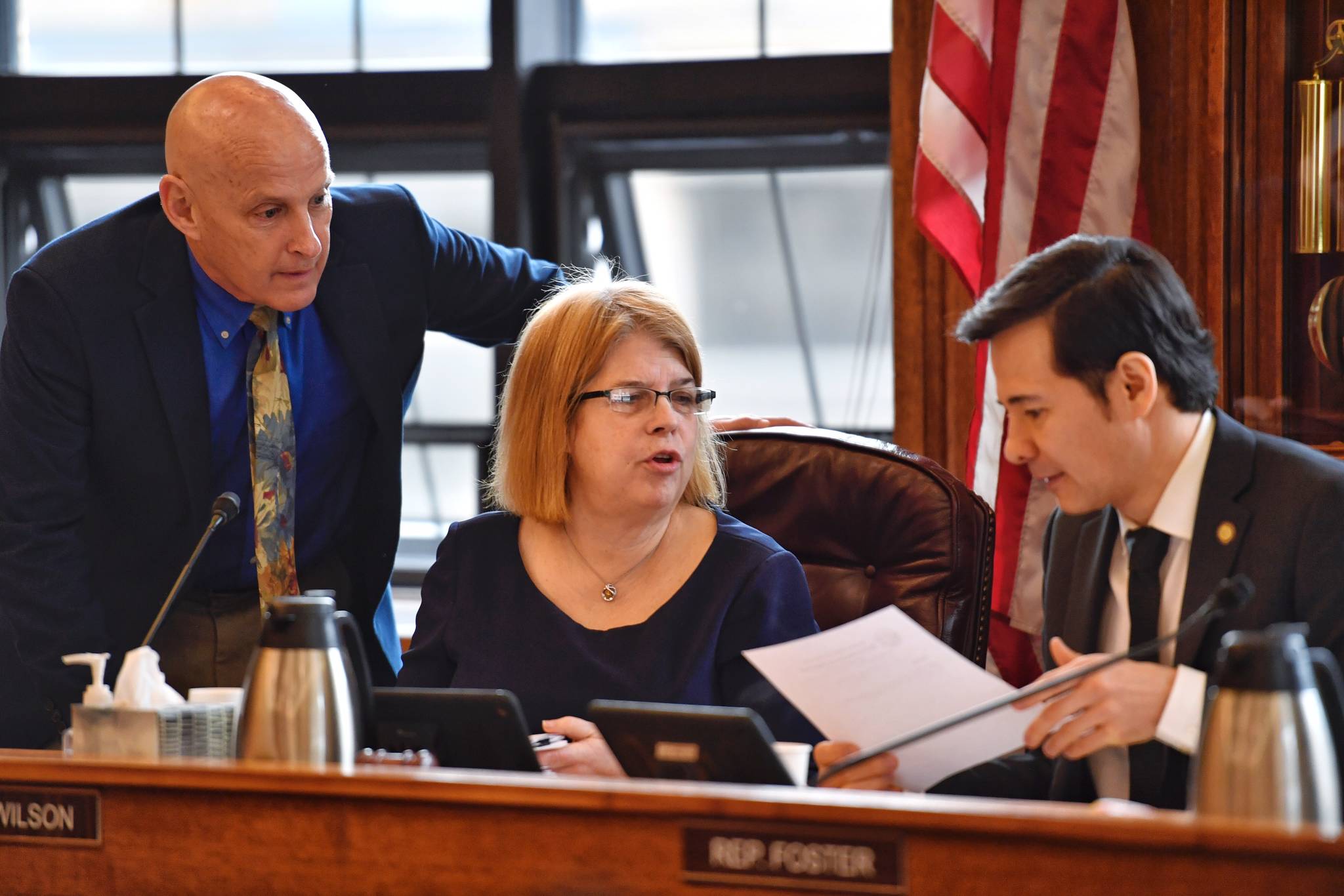2:15 p.m.
Rep. Colleen Sullivan-Leonard, R-Wasilla, raises a point of frustration that I’ve heard from a couple others in the building. The committee members are spending great deals of time going through programs that cost just a couple million dollars are less. With a deficit of over $1 billion, the Legislature faces some much bigger decisions.
“Where are we going to be at the end of this?” Sullivan-Leonard asks.
Still, as the committee rolls into its fourth hour of discussion for the day, the members are spending time pontificating and monologuing about these smaller programs and grants. This might be a very long process.
— Alex McCarthy
1:55 p.m.
As the House Finance Committee comes back together, here are a few photos from this morning’s meeting:
— Alex McCarthy
11:25 a.m.
By a vote of 6-5, the amendment cutting funding for the dairy inspector program is approved. No stamp, no problem…let’s hope.
— Alex McCarthy
11:20 a.m.
The past 20 minutes have been spent with representatives weighing whether to eliminate funding for milk inspectors. Carpenter talks at length about how healthy the milk he drinks is, and says it’s possible to have healthy milk without having an inspector stamp it.
— Alex McCarthy
10:55 a.m.
The amendment easily passes, by a vote of 8-3. Ortiz, Josephson and co-chair Neal Foster are the only people to vote against it.
Just before the vote, Merrick closed by saying she was born and raised in Southeast and cares about Alaska’s waters. She said it’s important that DEC doesn’t have any extra administrative burdens, and she has “much faith” in DEC to continue to do a good job enforcing laws and environmental standards.
— Alex McCarthy
10:47 a.m.
After a long at-ease, Ortiz points out that this program is funded by a $4 fee that cruise passengers pay, not by the state. As Department of Conservation Administrative Services Director Jeff Rogers said in the March 15 meeting, funding for the program does not come out of the state’s general fund.
— Alex McCarthy
10:35 a.m.
To nobody’s surprise, Carpenter has some thoughts on this. He points out that “cruise ships are big ships” and having one person on board probably doesn’t have a huge effect on how the ship operates. He also says he believes this program “burdens (the cruise industry’s) ability to do business.”
— Alex McCarthy
10:33 a.m.
Josephson jumps in, listing off cruise ship violations in Southeast and around the country.
“The industry will push as hard as it will possibly push,”’ Josephson says. “Without an observer there, it will push more.”
— Alex McCarthy
10:30 a.m.
Rep. Kelly Merrick, R-Eagle River, brings up an amendment that would repeal the Ocean Ranger program. This program puts a qualified marine safety and environmental protection official on all cruise ships that enter Alaska waters.
Gov. Mike Dunleavy also has a bill that repeals the program. Dunleavy and Merrick have both deemed the program “ineffective.”
Rep. Dan Ortiz, I-Ketchikan, says he wants to see evidence that the program is actually ineffective. He uses an analogy that Rep. Zack Fields, D-Anchorage, also used in a March 15 hearing about the Ocean Rangers program: Having an Ocean Ranger on a cruise ship has the same basic effect as having a State Trooper in your car. You’re much more likely to be a law-abiding driver with a Trooper on board, Ortiz points out. The same concept applies to having an Ocean Ranger on board.
In terms of statistics, Ocean Rangers have reported six violations in 11 years according to a presentation in that March 15 hearing. This is a low number, but Ortiz says he believes there have been so few incidents because of the above theory that having an Ocean Ranger there discourages ships from violating laws.
— Alex McCarthy
10:15 a.m.
It’s tough to follow all of this, as the committee takes a break every few minutes to talk with each other away from the microphones.
Carpenter, just like yesterday, takes every opportunity he can to pontificate on fiscal responsibility. For an amendment that would accept $100,000 in federal money for children’s nutritional programs, Carpenter talks about how the federal government is in debt and that he’s not voting for it “on principle.”
Rep. Andy Josephson, D-Anchorage, says he believes former U.S. Senator Ted Stevens would have accepted this money, for example. Josephson refers to this line of thinking as “the Stevens Doctrine.”
“We cannot solve Washington’s problems,” Josephson says. “Our best opportunity to do that is every four years at the ballot.”
Anyway, that amendment gets passed without objection, after another couple of at-eases so people can talk off the record.
— Alex McCarthy
9:35 a.m.
The slog through amendments has begun. Rep. Ben Carpenter, R-Nikiski, has been among the most vocal members during this week’s meetings, and has a paper sign on his desk with a message written in blue ink: “Fiscal responsibility matters.”
— Alex McCarthy
9 a.m.
The House Finance Committee is back at it again today. They’ll continue to examine amendments and wade through the budget, as they did yesterday. Today, they won’t have a floor session to take their time, so the focus today is entirely on the budget. If you look at today’s schedule, you’ll see a couple meetings canceled in the morning. I don’t know, but I imagine that’s due to them wanting to focus on the Finance Committee meetings.
We’ll be providing live updates here starting in a few.
— Alex McCarthy

